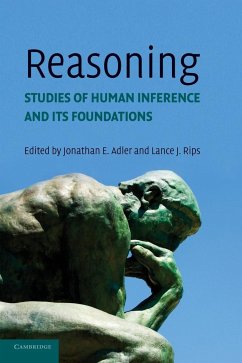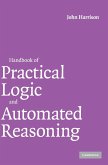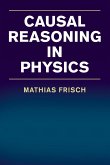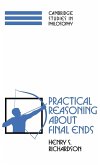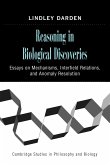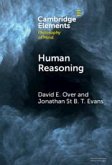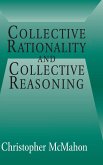- Gebundenes Buch
- Merkliste
- Auf die Merkliste
- Bewerten Bewerten
- Teilen
- Produkt teilen
- Produkterinnerung
- Produkterinnerung
An interdisciplinary collection of major essays on reasoning by a well-known group of philosophers, psychologists and cognitive scientists.
Andere Kunden interessierten sich auch für
![Handbook of Practical Logic and Automated Reasoning Handbook of Practical Logic and Automated Reasoning]() John HarrisonHandbook of Practical Logic and Automated Reasoning151,99 €
John HarrisonHandbook of Practical Logic and Automated Reasoning151,99 €![Causal Reasoning in Physics Causal Reasoning in Physics]() Mathias FrischCausal Reasoning in Physics36,99 €
Mathias FrischCausal Reasoning in Physics36,99 €![Practical Reasoning about Final Ends Practical Reasoning about Final Ends]() Henry S. RichardsonPractical Reasoning about Final Ends139,99 €
Henry S. RichardsonPractical Reasoning about Final Ends139,99 €![Reasoning in Biological Discoveries Reasoning in Biological Discoveries]() Lindley DardenReasoning in Biological Discoveries51,99 €
Lindley DardenReasoning in Biological Discoveries51,99 €![Human Reasoning Human Reasoning]() David E OverHuman Reasoning60,99 €
David E OverHuman Reasoning60,99 €![Collective Rationality and Collective Reasoning Collective Rationality and Collective Reasoning]() Christopher McmahonCollective Rationality and Collective Reasoning81,99 €
Christopher McmahonCollective Rationality and Collective Reasoning81,99 €![Abductive Reasoning in Science Abductive Reasoning in Science]() Finnur DellsénAbductive Reasoning in Science60,99 €
Finnur DellsénAbductive Reasoning in Science60,99 €-
-
-
An interdisciplinary collection of major essays on reasoning by a well-known group of philosophers, psychologists and cognitive scientists.
Hinweis: Dieser Artikel kann nur an eine deutsche Lieferadresse ausgeliefert werden.
Hinweis: Dieser Artikel kann nur an eine deutsche Lieferadresse ausgeliefert werden.
Produktdetails
- Produktdetails
- Verlag: Cambridge University Press
- Seitenzahl: 1072
- Erscheinungstermin: 28. Januar 2014
- Englisch
- Abmessung: 260mm x 183mm x 61mm
- Gewicht: 2165g
- ISBN-13: 9780521848152
- ISBN-10: 0521848156
- Artikelnr.: 24815786
- Herstellerkennzeichnung
- Libri GmbH
- Europaallee 1
- 36244 Bad Hersfeld
- gpsr@libri.de
- Verlag: Cambridge University Press
- Seitenzahl: 1072
- Erscheinungstermin: 28. Januar 2014
- Englisch
- Abmessung: 260mm x 183mm x 61mm
- Gewicht: 2165g
- ISBN-13: 9780521848152
- ISBN-10: 0521848156
- Artikelnr.: 24815786
- Herstellerkennzeichnung
- Libri GmbH
- Europaallee 1
- 36244 Bad Hersfeld
- gpsr@libri.de
Jonathan E. Adler is Professor of Philosophy at Brooklyn College and the Graduate School, City University of New York. His D.Phil. in philosophy is from Oxford University. His main areas of research are epistemology, philosophy of psychology, informal logic, ethics, and philosophy of education. In 2002, he published Belief's Own Ethics.
Lance Rips received his Ph.D. from the Psychology Department at Stanford University in 1974 and taught at the University of Chicago from 1974 to 1993. Since 1993, Rips has been a professor of psychology at Northwestern University. He is on the editorial board of Cognition, Public Opinion Quarterly, and Informal Logic.
Lance Rips received his Ph.D. from the Psychology Department at Stanford University in 1974 and taught at the University of Chicago from 1974 to 1993. Since 1993, Rips has been a professor of psychology at Northwestern University. He is on the editorial board of Cognition, Public Opinion Quarterly, and Informal Logic.
Preface
List of contributors
Introduction: philosophical foundations
Part I. Foundations of Reasoning: Section 1. Some Philosophical Viewpoints: 1. Change in view: principles of reasoning
2. Belief and the will
3. Internal and external reasons
4. Paradoxes
Section 2. Fallacies and Rationality: 5. When rationality fails
6. Extensional versus intuitive reasoning: the conjunction fallacy in probability judgment
7. Can human irrationality be experimentally demonstrated?
8. Breakdown of will
Part II. Modes of Reasoning: Section 3. Deductive Reasoning: 9. Logical approaches to human deductive reasoning
10. Mental modes and deductive reasoning
11. Interpretation, representation, and deductive reasoning
12. Reasoning with quantifiers
13. The problem of deduction
Section 4. Induction: 14. Patterns, rules, and inferences
15. Inductive logic and inductive reasoning
16. Reasoning in conceptual spaces
17. Category-based induction
18. When explanations compete: the role of explanatory coherence on judgments of likelihood
19. Properties of inductive reasoning
Section 5. Dual and Integrative Approaches: 20. Human reasoning and argumentation: the probabalistic approach
21. Individual differences in reasoning and the algorithmic/intentional level distinction in cognitive science
22. Reasoning, decision making, and rationality
Section 6. Abduction and Belief Change: 23. Defeasible reasoning
24. Explanatory coherence
25. Belief revision
26. Belief, doubt, and evidentialism
27. Reflections on conscious reflection: mechanisms of impairment by reasons analysis
28. Belief change as propositional update
Section 7. Causal and Counterfactual Reasoning: 29. Causal thinking
30. Causation
31. Propensities and counterfactuals: the loser that almost won
Section 8. Argumentation: 32. The layout of arguments
33. The skills of argument
34. Reasoning and conversation
Part III. Interactions of Reasoning in Human Thought: Section 9. Reasoning and Pragmatics: 35. Specificationism
36. Presupposition, attention, and why-questions
37. Further notes on logic and conversation
38. The social context of reasoning: conversational inference and rational judgment
Section 10. Domain-Specific, Goal-Based, and Evolutionary Approaches: 39. Domain-specific knowledge and conceptual change
40. Pragmatic reasoning schemas
41. Beyond intuition and instinct blindness: toward an evolutionarily rigorous cognitive science
42. Use or misuse of the selection task? Rejoinder to Fiddick, Cosmides, and Tooby
43. Why we are so good at catching cheaters
44. The modularity of mind: an essay on faculty psychology
45. Commitment Brian Skyrms
46. Evolution of inference
Section 11. Reasoning across Cultures: 47. Reasoning across cultures
48. Culture and systems of thought: holistic versus analytic cognition
49. On the very idea of a conceptual scheme
50. The truth in relativism
Section 12. Biology, Emotions, and Reasoning: 51. Logic and biology: emotional inference and emotions in reasoning
52. Distinct brain loci in deductive versus probabilistic reasoning
53. The emotional dog and its rational tail: a social intuitionist approach to moral judgment
Index.
List of contributors
Introduction: philosophical foundations
Part I. Foundations of Reasoning: Section 1. Some Philosophical Viewpoints: 1. Change in view: principles of reasoning
2. Belief and the will
3. Internal and external reasons
4. Paradoxes
Section 2. Fallacies and Rationality: 5. When rationality fails
6. Extensional versus intuitive reasoning: the conjunction fallacy in probability judgment
7. Can human irrationality be experimentally demonstrated?
8. Breakdown of will
Part II. Modes of Reasoning: Section 3. Deductive Reasoning: 9. Logical approaches to human deductive reasoning
10. Mental modes and deductive reasoning
11. Interpretation, representation, and deductive reasoning
12. Reasoning with quantifiers
13. The problem of deduction
Section 4. Induction: 14. Patterns, rules, and inferences
15. Inductive logic and inductive reasoning
16. Reasoning in conceptual spaces
17. Category-based induction
18. When explanations compete: the role of explanatory coherence on judgments of likelihood
19. Properties of inductive reasoning
Section 5. Dual and Integrative Approaches: 20. Human reasoning and argumentation: the probabalistic approach
21. Individual differences in reasoning and the algorithmic/intentional level distinction in cognitive science
22. Reasoning, decision making, and rationality
Section 6. Abduction and Belief Change: 23. Defeasible reasoning
24. Explanatory coherence
25. Belief revision
26. Belief, doubt, and evidentialism
27. Reflections on conscious reflection: mechanisms of impairment by reasons analysis
28. Belief change as propositional update
Section 7. Causal and Counterfactual Reasoning: 29. Causal thinking
30. Causation
31. Propensities and counterfactuals: the loser that almost won
Section 8. Argumentation: 32. The layout of arguments
33. The skills of argument
34. Reasoning and conversation
Part III. Interactions of Reasoning in Human Thought: Section 9. Reasoning and Pragmatics: 35. Specificationism
36. Presupposition, attention, and why-questions
37. Further notes on logic and conversation
38. The social context of reasoning: conversational inference and rational judgment
Section 10. Domain-Specific, Goal-Based, and Evolutionary Approaches: 39. Domain-specific knowledge and conceptual change
40. Pragmatic reasoning schemas
41. Beyond intuition and instinct blindness: toward an evolutionarily rigorous cognitive science
42. Use or misuse of the selection task? Rejoinder to Fiddick, Cosmides, and Tooby
43. Why we are so good at catching cheaters
44. The modularity of mind: an essay on faculty psychology
45. Commitment Brian Skyrms
46. Evolution of inference
Section 11. Reasoning across Cultures: 47. Reasoning across cultures
48. Culture and systems of thought: holistic versus analytic cognition
49. On the very idea of a conceptual scheme
50. The truth in relativism
Section 12. Biology, Emotions, and Reasoning: 51. Logic and biology: emotional inference and emotions in reasoning
52. Distinct brain loci in deductive versus probabilistic reasoning
53. The emotional dog and its rational tail: a social intuitionist approach to moral judgment
Index.
Preface
List of contributors
Introduction: philosophical foundations
Part I. Foundations of Reasoning: Section 1. Some Philosophical Viewpoints: 1. Change in view: principles of reasoning
2. Belief and the will
3. Internal and external reasons
4. Paradoxes
Section 2. Fallacies and Rationality: 5. When rationality fails
6. Extensional versus intuitive reasoning: the conjunction fallacy in probability judgment
7. Can human irrationality be experimentally demonstrated?
8. Breakdown of will
Part II. Modes of Reasoning: Section 3. Deductive Reasoning: 9. Logical approaches to human deductive reasoning
10. Mental modes and deductive reasoning
11. Interpretation, representation, and deductive reasoning
12. Reasoning with quantifiers
13. The problem of deduction
Section 4. Induction: 14. Patterns, rules, and inferences
15. Inductive logic and inductive reasoning
16. Reasoning in conceptual spaces
17. Category-based induction
18. When explanations compete: the role of explanatory coherence on judgments of likelihood
19. Properties of inductive reasoning
Section 5. Dual and Integrative Approaches: 20. Human reasoning and argumentation: the probabalistic approach
21. Individual differences in reasoning and the algorithmic/intentional level distinction in cognitive science
22. Reasoning, decision making, and rationality
Section 6. Abduction and Belief Change: 23. Defeasible reasoning
24. Explanatory coherence
25. Belief revision
26. Belief, doubt, and evidentialism
27. Reflections on conscious reflection: mechanisms of impairment by reasons analysis
28. Belief change as propositional update
Section 7. Causal and Counterfactual Reasoning: 29. Causal thinking
30. Causation
31. Propensities and counterfactuals: the loser that almost won
Section 8. Argumentation: 32. The layout of arguments
33. The skills of argument
34. Reasoning and conversation
Part III. Interactions of Reasoning in Human Thought: Section 9. Reasoning and Pragmatics: 35. Specificationism
36. Presupposition, attention, and why-questions
37. Further notes on logic and conversation
38. The social context of reasoning: conversational inference and rational judgment
Section 10. Domain-Specific, Goal-Based, and Evolutionary Approaches: 39. Domain-specific knowledge and conceptual change
40. Pragmatic reasoning schemas
41. Beyond intuition and instinct blindness: toward an evolutionarily rigorous cognitive science
42. Use or misuse of the selection task? Rejoinder to Fiddick, Cosmides, and Tooby
43. Why we are so good at catching cheaters
44. The modularity of mind: an essay on faculty psychology
45. Commitment Brian Skyrms
46. Evolution of inference
Section 11. Reasoning across Cultures: 47. Reasoning across cultures
48. Culture and systems of thought: holistic versus analytic cognition
49. On the very idea of a conceptual scheme
50. The truth in relativism
Section 12. Biology, Emotions, and Reasoning: 51. Logic and biology: emotional inference and emotions in reasoning
52. Distinct brain loci in deductive versus probabilistic reasoning
53. The emotional dog and its rational tail: a social intuitionist approach to moral judgment
Index.
List of contributors
Introduction: philosophical foundations
Part I. Foundations of Reasoning: Section 1. Some Philosophical Viewpoints: 1. Change in view: principles of reasoning
2. Belief and the will
3. Internal and external reasons
4. Paradoxes
Section 2. Fallacies and Rationality: 5. When rationality fails
6. Extensional versus intuitive reasoning: the conjunction fallacy in probability judgment
7. Can human irrationality be experimentally demonstrated?
8. Breakdown of will
Part II. Modes of Reasoning: Section 3. Deductive Reasoning: 9. Logical approaches to human deductive reasoning
10. Mental modes and deductive reasoning
11. Interpretation, representation, and deductive reasoning
12. Reasoning with quantifiers
13. The problem of deduction
Section 4. Induction: 14. Patterns, rules, and inferences
15. Inductive logic and inductive reasoning
16. Reasoning in conceptual spaces
17. Category-based induction
18. When explanations compete: the role of explanatory coherence on judgments of likelihood
19. Properties of inductive reasoning
Section 5. Dual and Integrative Approaches: 20. Human reasoning and argumentation: the probabalistic approach
21. Individual differences in reasoning and the algorithmic/intentional level distinction in cognitive science
22. Reasoning, decision making, and rationality
Section 6. Abduction and Belief Change: 23. Defeasible reasoning
24. Explanatory coherence
25. Belief revision
26. Belief, doubt, and evidentialism
27. Reflections on conscious reflection: mechanisms of impairment by reasons analysis
28. Belief change as propositional update
Section 7. Causal and Counterfactual Reasoning: 29. Causal thinking
30. Causation
31. Propensities and counterfactuals: the loser that almost won
Section 8. Argumentation: 32. The layout of arguments
33. The skills of argument
34. Reasoning and conversation
Part III. Interactions of Reasoning in Human Thought: Section 9. Reasoning and Pragmatics: 35. Specificationism
36. Presupposition, attention, and why-questions
37. Further notes on logic and conversation
38. The social context of reasoning: conversational inference and rational judgment
Section 10. Domain-Specific, Goal-Based, and Evolutionary Approaches: 39. Domain-specific knowledge and conceptual change
40. Pragmatic reasoning schemas
41. Beyond intuition and instinct blindness: toward an evolutionarily rigorous cognitive science
42. Use or misuse of the selection task? Rejoinder to Fiddick, Cosmides, and Tooby
43. Why we are so good at catching cheaters
44. The modularity of mind: an essay on faculty psychology
45. Commitment Brian Skyrms
46. Evolution of inference
Section 11. Reasoning across Cultures: 47. Reasoning across cultures
48. Culture and systems of thought: holistic versus analytic cognition
49. On the very idea of a conceptual scheme
50. The truth in relativism
Section 12. Biology, Emotions, and Reasoning: 51. Logic and biology: emotional inference and emotions in reasoning
52. Distinct brain loci in deductive versus probabilistic reasoning
53. The emotional dog and its rational tail: a social intuitionist approach to moral judgment
Index.

